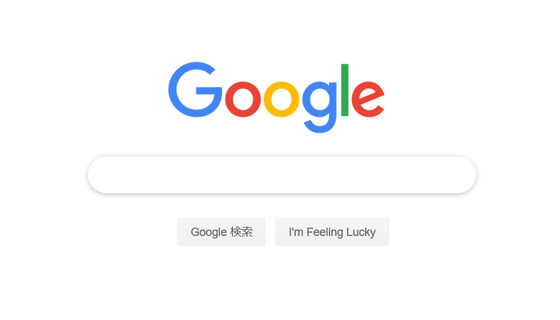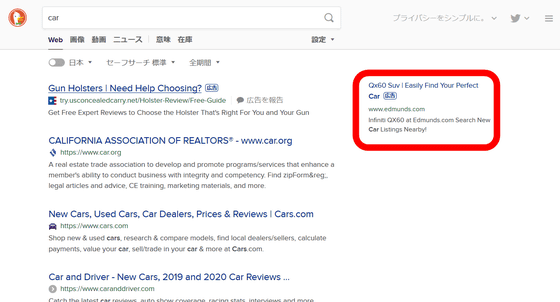Leading search engine DuckDuckGo's CEO strongly criticizes the issue of 'distorted search results with personal information collected by Google'

'
DuckDuckGo CEO Gabe Weinberg talks “do not track” legislation on Kara Swisher podcast Recode Decode-Vox
https://www.vox.com/recode/2019/5/27/18639284/duckduckgo-gabe-weinberg-do-not-track-privacy-legislation-kara-swisher-decode-podcast-interview
According to Weinberg, there are now a myriad of 'trackings' on the Internet, and we continue to collect data on users' privacy. Among these, 'search' is information that is most personal and does not want to be known to others, which is directly linked to your desires. However, Google continues to collect users' search history.

Weinberg criticizes not only that 'searched words' are tied to personal secrets, but also that there is no need to collect searched words to make money. In DuckDuckGo, for example, if you enter 'Car', a car ad will be displayed and you will receive income from that ad. This is an advertisement that is automatically displayed from the searched words, and is different from the '

On the other hand, in Google search, user information affects search results. A good example of this is the 'magic word' that Weinberg mentions when searching for another word immediately after searching for that word results in different results. When the first election of President Obama was held, 'Obama' was a magic word, so if you search for 'Obama' and then search for 'gun control', In the results, three search results that are not displayed when there is no search history of 'Obama' are added. This is not a cooperation or obstruction to the Obama faction, but a mere algorithmic problem because of the large number of searches for 'Obama', but Google distorts the search results based on the user's personal information. It is proof that you can
Weinberg says, 'Even if you and I search Google for the same word, the results you get are different,' as past search history, age, gender, nationality, living area etc. distorts the search results. Say. Therefore, there is a problem with '
Google says that users are changing their search results even if they are logged out of their account-GIGAZINE

With regard to 'Why Google collects such information,' Weinberg speculates that 'we can do it because we can do it,' and there is no regulation of this kind of information collection in the United States. We believe that we are continuing to collect information. On the other hand, not only the
Congress finally approves proposed amendments to EU's copyright directive that could significantly change the Internet-GIGAZINE

In the United States of America, the Personal Information Protection Act “CCPA” will be enforced in 2020 in California, and restrictions on information collection will be implemented.
Personal information protection law 'CCPA' enforced from 2020 is tougher for companies than GDPR-GIGAZINE

However, according to Mr. Weinberg, in the United States has been actively lobbying of companies that oppose the regulation of this kind, the prospect does not have standing to personal information protection laws, such as the CCPA throughout the United States comes into force.
Weinberg strongly recommends that Firefox and Chrome's 'Do Not Track' be turned on as a personally identifiable information protection activity, and 'Do Not Track' is set by default in each browser. It wants to be
The interview also touched on the topic of Facebook. Weinberg says that advertising on Facebook on Facebook should be illegal. Also, the Federal Trade Commission (FTC) has commented that Facebook has been fined up to $ 5 billion (¥ 560 billion) on privacy breaches, saying that it has 'one less than zero'.

Related Posts:
in Web Service, Posted by darkhorse_log






